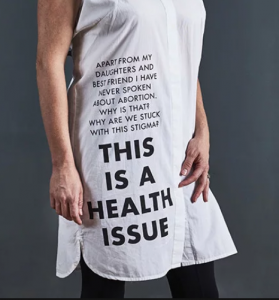
Dr Victoria Newton and Dr Lesley Hoggart, The Open University.
Challenging abortion stigma through story-telling
MyBody MyLife is an award-winning, multi-media travelling exhibition and website. Together, the exhibition and website aim to break open silences by using real-life stories of abortion. The stories in the exhibition show how easily an unplanned pregnancy can become part of women’s lives, how different women have taken their decision to have an abortion, and what the process was like for them.
Having an abortion is not unusual. Abortion is far more commonplace than many people realise. One in three women in the UK will have an abortion during their reproductive lifetime. Approximately 180,000 abortions take place in England and Wales every year.
However, abortion, like so much of women’s reproductive and sexual health, can be difficult to talk about. It is a topic often shrouded in secrecy and silence. Although one in three women will have an abortion, many do not talk about the choices they have made.
This means women do not talk about how easily an unintended pregnancy can happen. They do not speak about how they were using contraception, how they took emergency contraception, but still became pregnant, or how they ‘took a chance’, but didn’t ‘get away with it’ that time. It also means they do not talk about why they wanted an abortion in order to continue their lives in the way they had planned, before they became pregnant.
If we feel we cannot talk about something openly without judgment it can lead to stigma and shame. Our research (Hoggart, Newton and Bury, 2015) indicated that women felt very alone in their abortion experiences and were unaware how common abortion is in the UK.

My Body, My Life; http://mybody-mylife.org.
Many participants in the research internalised abortion stigma. This may explain some of the negative aspects of women’s abortion experiences, such as why some wish to conceal it. In response to our findings we wanted to do something to challenge abortion silence, and with it, abortion stigma, which is why we developed MyBody MyLife.
Research indicates that story-telling around abortion can be helpful in addressing abortion stigma (Cockrill and Biggs, 2017). The telling of stories is intrinsic to human culture. It is a way of exploring our connection with the world, and our experiences in it.

This is a health issue; stories are printed on items of clothing.
My Body My Life showcases women’s real stories of abortion visually. Stories are printed on items of clothing in different shapes and sizes, denoting the ordinariness of abortion. Visitors to the exhibition can ‘browse’ women’s stories.
The project also has a multimedia installation that enables participants to watch women’s stories. It is also interactive, allowing people to contribute their own stories. We have found this aspect particularly powerful:
“I am grateful to the exhibition and this portal which has helped me heal. It made me feel I am not the only one. It made me feel connected to strangers who have had this experience and I am ever grateful to you for this.” (Visitor to the exhibition)
We have seen that by encouraging people to speak out and tell their stories about abortion we can empower individuals to feel better about their experiences, to challenge the stereotypes about the women who have abortions, and ultimately, to challenge societal perceptions to ensure people have access to a basic right of reproductive health that is free from stigma and shame.
We have also found that by opening representing and enabling discussions about abortion, other spaces have opened up. For example, there has been media interest in the project with pieces appearing in I News; Huffington Post; Buzzfeed; The Mary Sue, Metro and Affinity Magazine.
If you would like to visit the website, select: http://mybody-mylife.org. You can also contribute to the discussion through our presence on Twitter and Instagram.
References
Cockrill, Kate and Biggs, Antonia (2017). Can stories reduce abortion stigma? Findings from a longitudinal cohort study. Culture, Health & Sexuality, 20:3, 335-350, DOI: 10.1080/13691058.2017.1346202.
Hoggart, Lesley; Newton, Victoria Louise and Bury, Louise (2015). “How could this happen to me?” Young women’s experiences of unintended pregnancies: a qualitative study. The Open University, Milton Keynes, UK. Online: http://oro.open.ac.uk/45138.
Acknowledgements
This post is jointly authored by Victoria Newton and Lesley Hoggart. Victoria is a Senior Research Fellow in the School of Health, Wellbeing and Social Care; Lesley is Associate Head of School (Research and Scholarship) School of Health, Wellbeing and Social Care.
My Body, My Life recently received a Highly-Commended Award. The Awards were funded by the University of Oxford’s ESRC Impact Acceleration Account (Grant Ref: ES/M500355/1).
